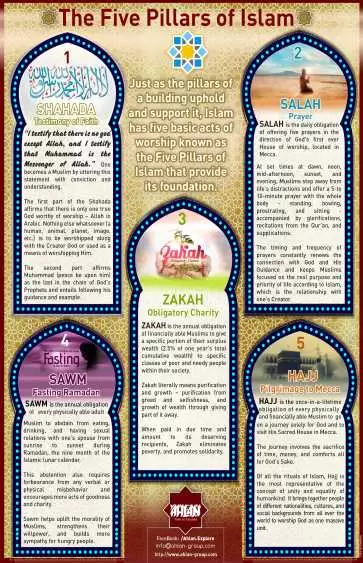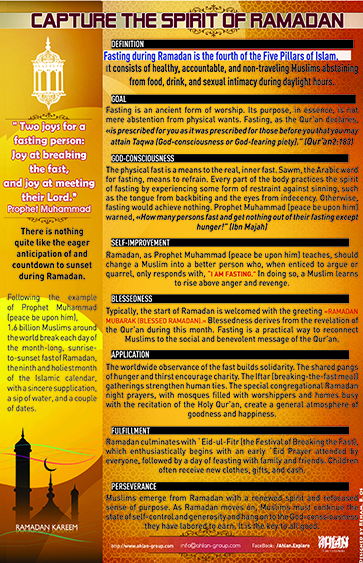Muslims believe that Allah will judge each individual based on their deeds and will determine their fate on the Day of Judgment, either to Heaven (Jannah), which embodies eternal happiness and comfort, or to Hell (Jahannam), which symbolizes punishment. Understanding this concept helps to appreciate Islamic values related to moral behavior and individual responsibility.
According to Islam, doing good deeds and having good qualities is the basis for a good life and a better eternal future. It is believed that a person’s actions in this world have a direct impact on their fate after death.
Does Islam Believe in Heaven and Hell?
Islam firmly believes in the existence of Heaven (Jannah) and Hell (Jahannam), portraying them as ultimate destinations based on one’s faith and deeds. Heaven is described as a place of eternal joy and perfection for those who obey Allah and lead righteous lives, while Hell signifies severe punishment for disbelievers, hypocrites, and wrongdoers.
The Quran and Hadith emphasize moral accountability, outlining actions that lead to either reward or punishment, such as prayer, honesty, and avoiding major sins. Both realms underscore Allah’s justice, rewarding goodness and rectifying transgressions.
Heaven is depicted as a paradise filled with unimaginable blessings, offering peace and eternal companionship with Allah. Conversely, Hell is portrayed as a place of unimaginable torment, with varying levels of punishment based on the severity of sins.
Some Muslim sinners may experience Hell temporarily for purification before entering Heaven through Allah’s mercy. This dual belief serves as a moral compass, urging individuals to strive for good deeds, repentance, and unwavering faith to attain eternal peace in the Hereafter.
Let’s discuss them in more details:
Does Islam Believe in Hell?
Islam believes in the concept of Hell (Jahannam) as a place of punishment for those who reject faith, commit major sins without repentance, or act unjustly. It is described in the Quran and the Hadith as part of the afterlife where individuals are held accountable for their actions in this world.
Hell is described as a place of intense suffering, both physical and spiritual, and is a punishment for bad deeds. Hell has degrees and levels of punishment that vary according to the gravity of the sins committed.
Is Hell Mentioned in the Quran?
Indeed, the Qur’an makes several references to Hell (Jahannam). The most often used wording, Alnaar (Hell), occurs 126 times in the Qur’an. Here are the positions where the word “Hell” is mentioned:
1. Hell is a Place of Return
Allah says in the Quran:
(Indeed, Hell has been lying in wait for the transgressors, a place of return, in which they will remain for ages.)
Hell is a reminder of the importance of moral accountability and the consequences of choices in life. It reflects God’s justice, where ultimate rewards and punishments are meted out based on a person’s actions.
2. Hell is Prepared for the Disbelievers
Allah says in the Quran:
(And fear the Fire, which has been prepared for the disbelievers.)
This verse warns people to be conscious of and avoid the Hellfire, which has been prepared for those who reject Allah and His guidance (the disbelievers).
3. Hell Has Boiling Water
Allah says in the Quran:
(They will be given to drink boiling water that will sever their intestines.)
This verse describes the intense and unimaginable punishment that the disbelievers will face in Hell. They will be forced to drink boiling water, which will cause extreme pain, even to the point of tearing their internal organs apart. It emphasizes the severe nature of the punishment in Hell.
4. Hell Has Fire that Burns Faces
Allah says in the Quran:
(The Fire will scorch their faces, and they will grin with displaced lips.)
This verse portrays the physical suffering of the people in Hell. The fire will burn their faces, causing them to distort their features in agony. It paints a vivid image of the pain and suffering the disbelievers will endure and how their faces will show the signs of this torment.
Who Enters Hell According to Islamic Beliefs?
The people of Hell are divided into different categories based on the type and severity of the sins they have committed. Among them are,
1. Disbelievers (Kuffar)
Allah says in the Quran:
(But those who disbelieve and deny Our signs—those are the companions of the Fire)
(Quran 5:10).
Those who deny the existence of Allah or reject faith in His messengers and scriptures.
2. Polytheists (Mushrikun)
Allah says in the Quran:
(Indeed, he who associates others with Allah—Allah has forbidden him Paradise, and his refuge is the Fire) (Quran 5:72).
Those who associate partners with Allah, such as idols or humans.
3. Hypocrites (Munafiqun)
Allah says in the Quran:
(Indeed, the hypocrites will be in the lowest depths of the Fire )
Hypocrites are those who outwardly claim faith but inwardly reject it. They are in the lowest level of Hell.
4. Oppressors and Tyrants
Allah says in the Quran:
(And the wrongdoers will have no helper)
Oppression and tyranny are major sins that lead to Hell, including violating others’ rights and committing injustices.
5. Those Who Consume Usury and Orphans’ Wealth
Allah says in the Quran:
(Those who consume usury cannot stand except as one stands who is being beaten by Satan into insanity) (Quran 2:275).
Those who deal in usury (riba) or unjustly consume the wealth of orphans face severe punishment.
6. Those Who Abandon Prayer and Tawhid
Allah says in the Quran:
(What has brought you into Hell? They will say, ‘We were not of those who prayed’)
Prayer is the foundation of Islam, and neglecting it deliberately or carelessly can lead to severe consequences.
7. Backbiters and Liars
The Prophet (PBUH) said:
“I saw people with copper claws scratching their faces and chests. I asked, ‘Who are these, O Gabriel?’ He said, ‘These are those who ate the flesh of others (by backbiting) and attacked their honor.’”
(Narrated by Ahmad).
Backbiting and lying are grave sins that earn the wrath of Allah.
8. The Arrogant
Arrogance and pride are characteristics of the inhabitants of Hell.
The Prophet (PBUH) said:
“No one will enter Paradise who has even a mustard seed’s weight of arrogance in his heart.”
(Narrated by Muslim).
Does Islam Believe in Heaven?
Surely Islam fervently believes in Heaven, or Jannah as it is known in Arabic. It is a fundamental principle of the Islamic faith and represents the ultimate reward for believers who obey Allah’s commands and live a righteous life.
Allah says in the Quran:
But they who believe and do righteous deeds—those are the companions of Paradise; they will abide therein eternally.
Heaven in Islam is a place of eternal joy that Allah has prepared for His faithful servants and those who follow His guidance. It is a realm of perfect happiness, free from any flaws or imperfections.
How Many Times Was Heaven Mentioned in the Quran?
The term “Heaven,” referred to as Jannah in Arabic, appears approximately 139 times in the Quran in its various forms, such as singular, plural, or possessive. It is not easy to determine the number of times Heaven is mentioned in the Holy Quran due to its similarity to a number of words. You can click on this link for exploring the names of Heaven or paradise and the number of times they are mentioned in the Quran.
What are the Names of Trees Mentioned in the Quran that Are in Heaven?
The Holy Quran mentioned the names of some trees in Heaven that are unlike the trees of this world as a reward for the believers for the righteous deeds they did in their worldly life, and they are as follows:
1. The Lote Tree (Sidr)
This tree is mentioned in the Quran in Allah’s statement:
“And the companions of the right—what are the companions of the right? In lush lote trees”
The lote tree, also known as the jujube tree, is a tree with thorns in this world. However, in Paradise, it will be thornless, as indicated by the term “makhdud” (free of thorns).
Allah says in the Quran:
“And he certainly saw him in another descent, at the Lote Tree of the Utmost Boundary -Near it is the Garden of Refuge -When there covered the Lote Tree that which covered [it].”
This is the tree that Prophet Muhammad (peace be upon him) saw in Paradise, describing its leaves as colorful and large.
2. The Talh Tree
Allah mentions Talh tree in continuation of the verses in Surah Al-Waqiah:
“And Talh trees layered [with fruit]”
The Talh tree, which is native to the Hejaz region, is a thorny plant in this world. Yet, in Paradise, it will be “layered”—prepared by Allah for consumption without any effort or hardship.
3. Wisdom Behind Mentioning Sidr and Talh
Allah’s mention of the Sidr tree, which produces sparse and modest fruit, and the banana tree, which is primarily valued for its shade in this world, serves a profound purpose. It emphasizes that if such trees, which offer limited benefit in this world, are transformed into something extraordinary in Heaven, then the trees of greater value and benefit in this world will be unimaginably magnificent in the Hereafter.
How to Attain Paradise in Islam
Here is a summary of the most important of acts that we can do to obtain Paradise:
1. Acts of worship
- Praying on time: It is the pillar of religion, and whoever maintains it will be promised entry into Heaven.
- Fasting: Fasting during Ramadan and voluntary fasting, as Allah keeps Hell away from the face of the fasting person for seventy autumns.
- Hajj and Umrah: An accepted Hajj has no reward but Heaven, and Umrah expiates sins.
2. Acts of transaction
- Honoring one’s parents: Allah linked obedience to Him with honoring one’s parents.
- Removing harm from the road: Removing harm from the road is a reason for entering Heaven.
- Honesty and honesty in trade: The honest and trustworthy merchant will be resurrected with the prophets and the truthful.
- Helping the needy: Fulfilling people’s needs is a reason for attaining Allah’s mercy and forgiveness.
- Suppressing anger and rising above arguments: Whoever suppresses his anger, Allah will honor him in the Hereafter.
3. Avoiding Forbidden Things and Sincere Repentance
Avoiding major sins and transgressions and repenting from them is one of the greatest reasons for entering Heaven.
If you avoid the major sins which you are forbidden, we will remove from you your lesser sins and admit you to a noble entrance [into Paradise].
Heaven and Hell: Temporary or Eternal in Islam?
In Islam, Heaven is eternal for righteous believers as a reward from Allah, while Hell is eternal for unbelievers and polytheists. Muslims who have committed sins may enter Hell temporarily for purification before entering Heaven by Allah’s mercy.
The Prophet (PBUH) said: ” the caller will say, ‘O people of Paradise! Eternity for you and no death O people of Hell! Eternity for you and no death.”
(Sahih al-Bukhari 4730.
We can discuss this point in detail in the following lines:-
1. Eternity of Heaven:
“They will be in the Gardens of Eternity, promised in trust by the Most Compassionate to His servants. Surely His promise will be fulfilled.”
Allah states in this Quranic verse that Heaven is eternal for His righteous servants.
2. Eternity of Hell
And whoever disobeys Allah and His Messenger will certainly be in the Fire of Hell, to stay there for ever and ever.
Allah states in this Quranic verse that Hell is eternal for His vicious servants.
3. Temporary Fire for Sinners from Muslims:
“Indeed, Allah does not forgive association with Him, but He forgives what is less than that for whom He wills.” (Quran4: 48).
Allah states in this Quranic verse that everything can be forgiven except to make a partner equivalent to Allah, Consequently, He can forgive those who are in Hell who did not do that.
Conclusion
Ultimately, Heaven and Hell remain a constant reminder of Allah’s wisdom, justice, and mercy. Heaven is the destination of those who seek to obey God and do good deeds, while Hell is the destiny of those who turn away from the truth and deny God’s signs. Choose your path today, for the afterlife is the truth worth thinking about and working towards.













